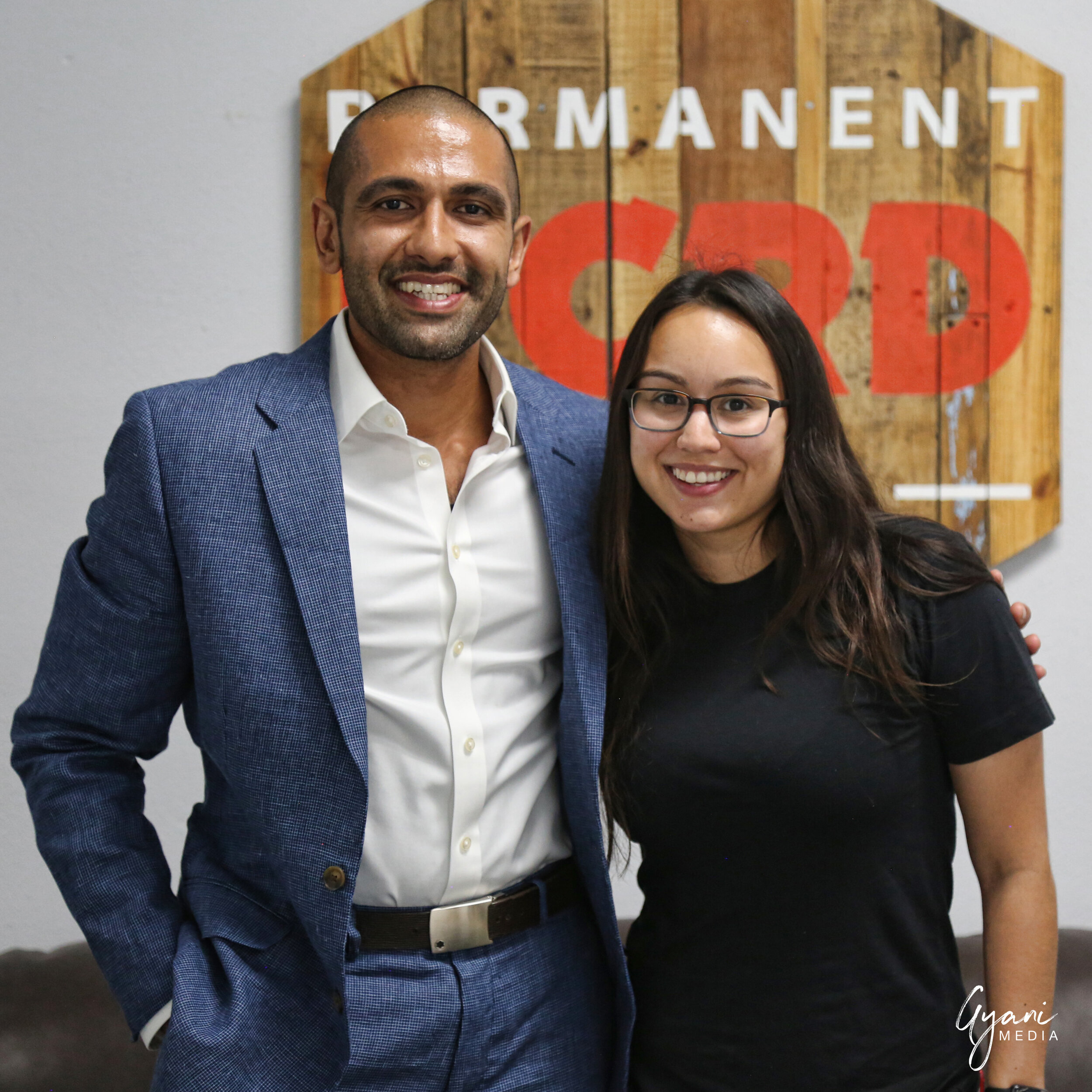Podcast Blog #1: Lauren Welch — Overcoming self-doubt and adversity to build a healthcare startup (Fear is a Liar: Ep. 1)
Have you ever felt that you are not enough? Maybe you grew up in a family where you have never heard a word of encouragement? Parents could not show you a path to success, and survival seemed to be the only way to live life? How can you possibly become successful and break out from that environment and build a different legacy for yourself?
In this episode, we hear how Lauren Welch faced these moments and went from a high school job at a pharmacy to co-founding an international medical records business.
Starting a business is challenging in most circumstances. Long hours, startup funding, and hoping your idea is good enough often inhibit people from succeeding as an entrepreneur. But for Lauren, co-founder of XELPHAHealth, barriers in her life made it an even steeper uphill climb. From almost skipping college, to co-founding a startup in healthcare, Welch has overcome countless challenges of self-doubt and adversity to get where she is today. But, those moments were fundamental to some of her greatest successes. It all started with a difficult family situation, followed by countless jobs working grueling hours and finally resulted in years of flipping the odds until she ended up at the top.
Here are some key takeaways from my interview with Lauren:
The desire not to fail can be as powerful as the desire to succeed (2:34)
Without positive reinforcement, Lauren’s desire not to fail was stronger than her desire to succeed. She grew up with many examples of what not to do, from a father who was incarcerated to a parental attitude where nothing ever seemed to be good enough. She never thought college was in her future — but her high school teachers convinced her to apply.
“It’s not that I didn’t think I could do it, it just wasn’t planted in my head,” Lauren said about her college planning. But even with the push of her teachers, going to college felt risky. It was shortly after the 2008 recession when thousands of college graduates couldn’t find work. So, Lauren went to Texas State, but she also took on a second job at a local medical center. What motivated Lauren to manage two jobs and school, even when this was not her original plan?
The fear of failure.
Lauren’s early experiences show that taking on new challenges and risks can prove worthwhile if you have a motivation that is pushing you to make those things successful. Success doesn’t come alone from getting a specific degree or starting a specific career, but you need motivation to work hard.
Be an intuitive problem solver (11:00)
In her medical roles, Lauren discovered an information bottleneck where patients were waiting much longer than necessary for their medications, all due to a lack of communication between systems. She was frustrated that this constantly slowed the ability for patients to get medical help.
At the same time, she met Carlos, a resident at the medical center. Carlos planted the seed that there could be a business idea to address this problem in Kenya, a country that was going through a period of digital growth and would be open to new technology.
With their business idea in hand to create a digital medical records system, Lauren pivoted in her education. Recognizing that the business office at hospitals make most important decisions on patient care (rather than even senior physicians), she quickly decided on business school rather than a health degree. And getting into business school took some creative problem solving. Given that she lacked necessary prerequisites to get in, she found a creative solution by applying as a science student and requesting a transfer shortly after she was accepted.
Without speaking up about her idea, Lauren may have never discovered that a colleague, Carlos, was also interested in tackling this challenge and building a business. Lauren wasn’t afraid to shift her plans for college in order to pursue the potential launch of the business. If you are passionate about something, don’t hesitate to go off the beaten path to work toward that goal, even if it’s more work than you thought.
“That’s for them, that’s not for me” (14:37)
With Carlos’s brother Frank joining their efforts to start this company in Kenya, the team looked to start sharing their idea and growing as entrepreneurs. So, they applied to the MIT’s Global Entrepreneurship Bootcamp. After five rounds of interviews, all three were accepted to the program despite its 2% acceptance rate. They quickly felt the pressure and began picking up the pace to keep up.
The bootcamp helped Lauren face and overcome her imposter syndrome that she’d often experienced. Previously, she’d put herself in a box describing how successes like these were for others, but not her. Post-graduation of the hyper competitive bootcamp, she took a different perspective and shared how her past adversity benefited her and made her a better candidate throughout. Because she’d struggled, she didn’t accept that the status quo was good enough.
Sometimes, you have to put yourself out there even when something seems like the wrong fit or like it isn’t meant for you. Lauren’s story shows that a) those fears could prevent you from doing something you actually ARE qualified for and b) you can learn a new lesson from putting yourself in uncomfortable situations.
Importance of self-awareness, vulnerability, and mental wellness for founders (25:18)
After the MIT bootcamp, XELPHAHealth was moving forward. Carlos and Frank went to Kenya to start building relationships on the ground with health facilities and developing the actual product. Meanwhile, Lauren stayed in the US to build partnerships and to raise funding through pitch competitions. An awkward moment arose in several competitions when judges would ask “Well, have you been to Kenya?” Lauren admittedly said no, however, she quickly pivoted and shared the importance of her fundraising efforts in the US were much more valuable than her traveling with the team. The results were obvious as she quickly raised over $800k in cloud services credits from Google, Amazon, and others to lower the XELPHA’s overhead, when they needed it the most.
“Done is better than perfect, just get it done, and then navigate that space,” Lauren said about her time at the startup. She described how you can strive for perfect after you’ve gotten off the ground, but if you only accept perfection, it can stunt your growth. When facing a challenge, it’s important to manage with what you have available and make the most of your circumstance. Instead of letting barriers stop you, just take them as an opportunity to pivot and consider your other strengths and opportunities. A key for Lauren was not just finding mentors, but rather focusing on finding peers who were facing similar challenges as her.
Outro (30:53)
After numerous obstacles and new paths uncovered, XELPHAhealth has found success in Kenya with several health partners and is working on more ways that it can improve the health system through digital, integrated tools, both abroad and in the US.
Shout-outs
A quick shout out to Erin, Shady, Zane, and Simon who helped me produce the show. Thank you. To my daughter Savreen and our future Gyani’s, I hope you hear or read about this episode one day, and it provides some value on your journey. For the readers and listeners, if the show provided positive takeaways, please subscribe, leave an apple podcast review, and share with others in your network.
Thanks for checking out the FEAR is a LIAR podcast blog -- Where we share how my guests embraced all the FEARs related to risk, self-doubt, failure, unknowns, what didn’t work, and how they dealt with it.
I’m Out.
Ep. #1 | Fear is a Liar Podcast w/ Lauren Welch & Ronnie Gyani
0:00 | Intro
2:34 | The desire not to fail can be as powerful as the desire to succeed
11:00 | Be an intuitive problem solver
14:37 | “That’s for them, that’s not for me”
25:18 | Importance of self-awareness, vulnerability, and mental wellness for founders
30:53 | Outro
Links & Resources
Lauren Welch and Ronnie Gyani, Austin Texas — Permanent RCRD Studios



